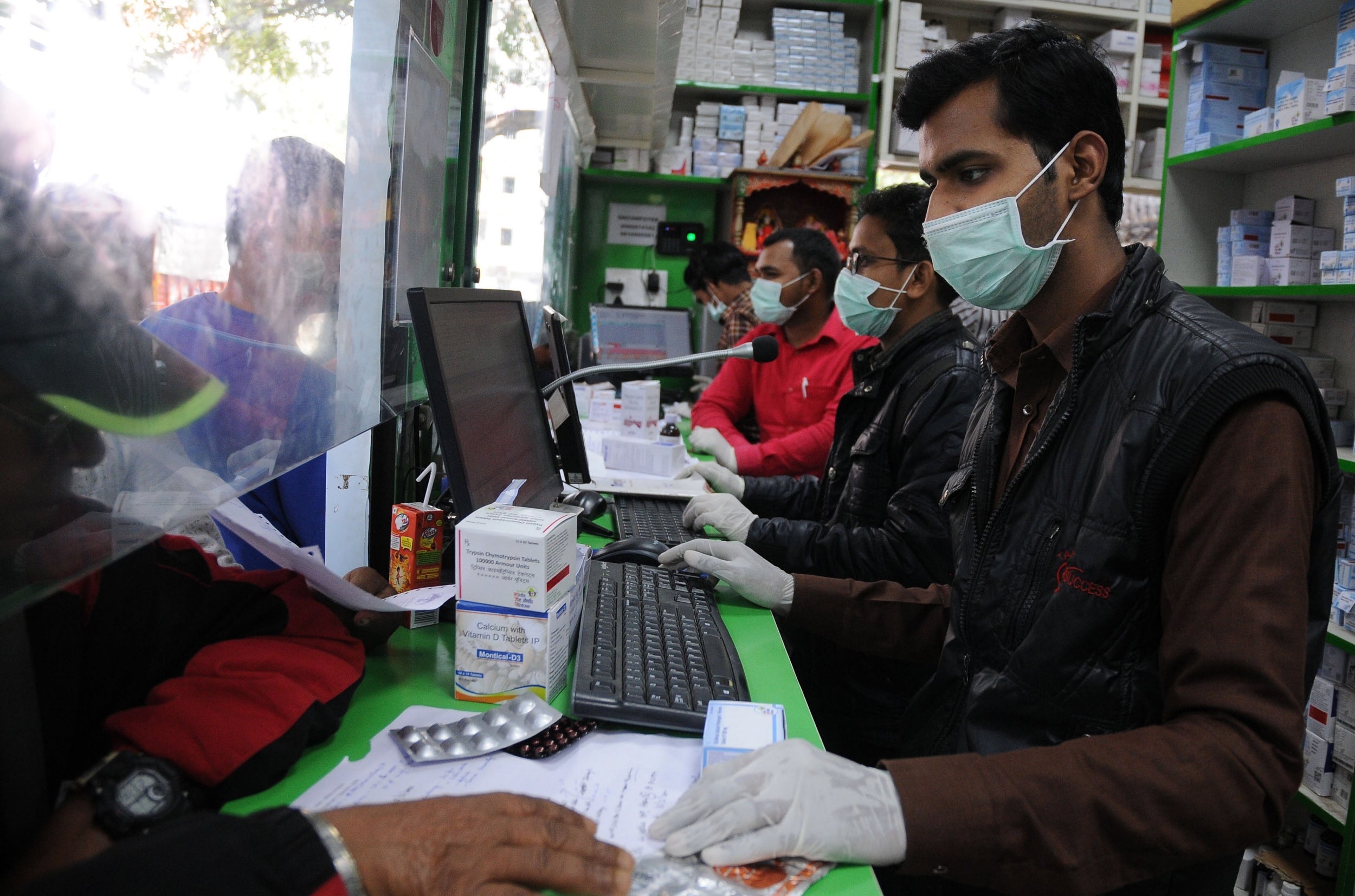Coronavirus: India's ruling party hands out Modi-branded face masks to 'save people' from disease
Party official says masks will have added bonus of protecting public from air pollution

India’s ruling party has been mocked for handing out anti-coronavirus face masks adorned with the name of the prime minister Narendra Modi, as the number of virus cases in the country rose to 29.
The initiative was taken by the regional branch of Modi’s BJP party in West Bengal, a state where campaigning has already begun ahead of assembly elections next year.
More than 1,600 masks, produced at a cost of about Rs175 (£1.85) each, were handed out on Wednesday in less than an hour, according to the Kolkata Telegraph, with party workers and some local residents the main beneficiaries.
The party’s general secretary in the state, Pratap Banerjee, told reporters that the masks “will help people to protect themselves from coronavirus”, while providing the added benefit of “respite from the air pollution in the city”. The air quality index in Kolkata was hovering around 100 on Thursday, similar to that of the famously smoggy capital Delhi.
But some on social media took issue with the fact that the masks were printed with the words: “save from corona virus infection” and “Modi ji” (Modi sir), alongside the party’s lotus symbol.
Shashi Tharoor, a prominent author, TV personality and MP for the opposition Congress party, joked on Twitter that the masks were for “those wanting to be saved from coronavirus & Modiji”. “Of course merely listing the toxic afflictions you want to be saved from on a mask doesn’t help prevent your being hit by the contagion,” he added.
He wasn’t the only one to take up this theme, with another user bemoaning that the mask to “save you from coronavirus, Modi and the BJP” was an “offer valid only in West Bengal… everyone else find other means”.
One Twitter user named Soumya, referencing the recent dramatic slowdown in India’s economic growth, suggested the mask “will save a person from coronavirus exactly the same way as Modi saves India’s economy”.
And another, Arjun Ramakrishnan, referenced the Hindu nationalist agenda of Mr Modi’s party, saying he would “rather die of Corona virus than wearing [a] Modi mask and infecting the nation with Communal virus”.
Away from the stunt in Kolkata, the Indian government is taking the coronavirus outbreak very seriously indeed, despite the relatively low numbers of cases it is seeing.
All foreign nationals from Italy, South Korea, Japan and Iran - some of the worst-affected countries - have had their visas to visit India cancelled, while the government long since barred new entrants from China.
Mr Modi himself has said he will not take part in celebrations of the Hindu festival of Holi next week, and on Thursday postponed plans for a trip to Brussels for meetings with EU leaders later this month.
"Both sides have agreed that due to health authorities advising against travel between regions, it would be wise to reschedule the summit to a later, mutually convenient date," foreign ministry spokesman Raveesh Kumar told a news conference.
Delhi’s devolved government has decided to close all primary schools in the capital until the end of March in a bit to prevent the possible spread of the virus. Of the 29 cases in the country, one was linked to a school in the city of Noida - a satellite city bordering Delhi to the east - and 15 are members of a group of Italian tourists who are being quarantined to Delhi’s west.
India’s poor health infrastructure may be masking the true extent of the coronavirus threat to the country, but experts say it does have a natural defence in the form of its nearly year-round warm weather.
The first cases in the country arrived from China in the southern state of Kerala, but amid the hot, humid tropical conditions there no new cases have been reported since the 6 February.
Even in northern Delhi, minimum temperatures did not drop below 5C at any point last month, and the mercury is rapidly rising through March. “Viruses thrive in lower temperatures, which is why [Covid-19] has spread fast[er] to south-east Asian countries that are cooler and less humid than India,” said KK Aggarwal, President, Heart Care Foundation of India.
Join our commenting forum
Join thought-provoking conversations, follow other Independent readers and see their replies
Comments
Bookmark popover
Removed from bookmarks